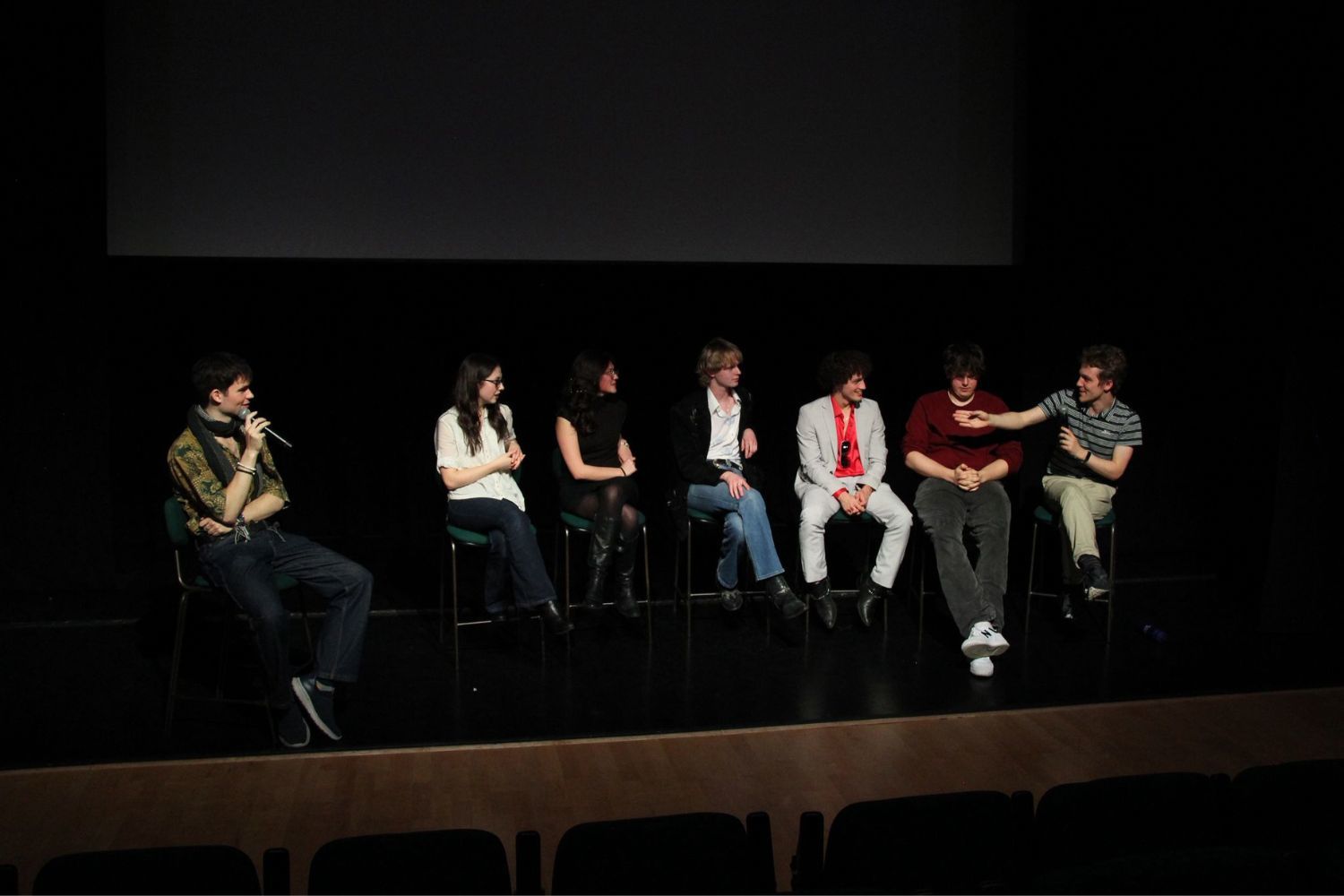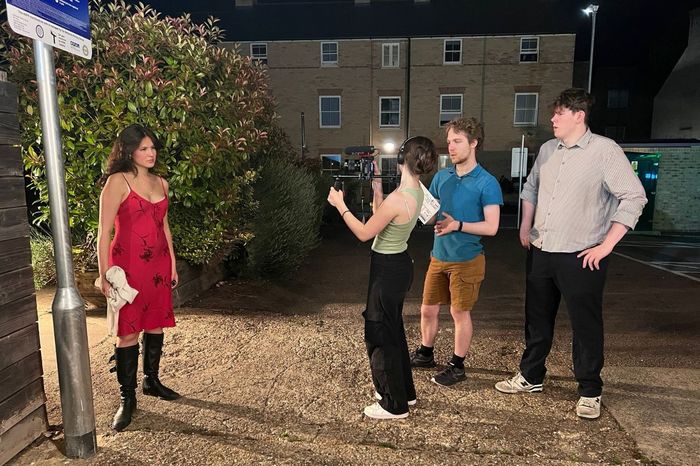On October 30th, Silver Street Productions stepped into the spotlight with its first official screening. Held in the Fitzpatrick Hall, the amateur film production society from Queens’ presented two short films: The Hotel Bed and What’s My Name. Despite some rocky technical difficulties at the start – gracefully handled by Co-presidents Millie Hine and Aidan Collins – both the films mark an exciting debut, hinting at a creative voice beginning to find its stride.
The first film shown was What’s My Name, written and directed by Millie Hine. The plot centres on a dinner between the fiery Rebecca (Emma Dawes) and her entitled date, Rob (Joe Orrell). Despite Rebecca’s initial excitement, things quickly turn sour once she gets a profound sense of her date’s arrogance, a look of overpowering boredom on her face as Rob outlines his business adventures in the automobile industry without asking a single question back. His monologue is interrupted when Rebecca, displaying a far deeper understanding of cars than her date had initially presumed, asks a question which strips away his confident veneer. Now in the driving seat, she instructs Rob that if he answers her three questions correct, she’ll “let [him] drive her” Lotus Emira parked outside, and promises her date on the last question that, if he gets it correct, “I’ll let you f*ck me in the back of it”. Unsurprisingly, Rob falls at the easiest hurdle.
It is the wonderful acting of Emma Dawes that really helps to transfer the tension to the audience. Not only is Emma great during Rob’s extended narrations, conveying a pervasive sense of claustrophobia, but she is also great at cultivating an alluring air of mystique and destabilizing sexuality that feels so central to Rebecca’s character. In the Q&A held after, Millie affirmed that she was particularly concerned with subverting the “manly” theme of the film, asserting privately to me that she felt it was important to point out “the obstructive barriers of masculine conceit” which frequently work as a “form of social dominance”.
“Both the films mark an exciting debut, hinting at a creative voice beginning to find its stride”
Nevertheless, in spite of convincing acting, attractive cars, and race-y sexual tension, there were some technical parts of the film that did feel like they could be refined. The camera work was sometimes a bit shakey, and the audio lacked a crispness that would have benefitted a film that relies so heavily on dialogue. Moreover, Emma does not seem entirely comfortable in the flashy car, where Rebecca definitely would have, and the cinematography awkwardly draws attention to itself through limited lighting and what feels like a heavy, cumbersome camera in distinction to the smooth Lotus. Afterwards, Millie herself admitted that the film could work from some “technical polishing”, declaring that the film was shot the “day after I finished my exams”. All this being said, the film was very impressive, with a captivating and triumphant atmosphere.
The second film was The Hotel Bed, written by Jay Palombella and, once again, directed by Millie Hine. The film opens with some light flute playing – composed by Tada Boyle – as the camera cuts between different objects across the room, all in a tantalizing warm hue. This framing lays the ground for the central tensions in the narrative: the quiet room anticipates the uncomfortable intrusion from the groom-to-be Ben (Harry Lloyd Yorke) and his child-hood best friend Tom (Marques Monteiro).
Once the pair jarringly enter the room, they quickly realise, much to Ben’s disappointment and Tom’s delight, that they will have to share a bed. It is slightly awkward, but nothing two old friends cannot manage. However, once cozier and beneath the covers, the more confident part of the pair, Tom, breaks the uncomfortable silence, and takes the film in a more explicit direction. He directly inquires to the coy Ben, “Are you still gay?” Ben responds, claiming that, “What I wank to is not [interesting]”, but there is clearly more of a story to tell. After deliberating and obfuscating back and forth, including a tangential discussion of Ben’s family (which loses none of its pointedly Freudian charm), Ben, and his repressed homosexuality, seemingly have nowhere else to hide. Tom is not in any way disapproving or triumphalist, instead attempting to draw more out of Ben, as any supportive friends would (“being open about this stuff is very important”). Ben asks to leave it, but when the light is turned off and he turns over, a blue light is cast over his pained face as he reveals that “I don’t love her [his fiancé] and I think she knows it”. The camera holds for an uncomfortably long time, both conveying the emotional intensity of the scene and Harry’s professional acting calibre. The rawness is broken as Tom turns the red light back on, declaring that there is “nothing cowardly or idiotic about not understanding this”. Ben reaches for Tom and the film ends on Tom’s soft, reassuring words: “Its alright, it's alright.”
In The Hotel Bed, the quality and talent of Silver Street Productions really shines bright. This is not to say that all the student charm of What’s My Name is lost, but you really get to see the society working towards greater professionalism. Beyond smoother camera work and technical proficiency, this competence is reflected in the more complicated thematic elements. The film reinterrogates traditional coming out-narratives against the backdrop of increased sexual freedom, and the social advancements afforded towards modern queer identities. In this cultural frame, to deny yourself, as Ben acknowledges, is not the tragic story of forced repression experienced in the “f*cking sixties” but a “pathetic” tale of inauthentic living – more of a “loser” narrative than anything else.
“You really get to see the society working towards greater professionalism”
However, despite this seemingly “liberal” age, The Hotel Bed softly suggests that the difficulties of identity are still as prominent and require just as much cautious attention. The persistent references to Ben’s parents, the taboo intimacy of heterosexual masculine friendships, and the litigative burden of marriage, similarly weigh upon Ben’s concealed sexual orientation, and suggest that it is never as simple as unshackling the chains of social anxiety to expose a single identifiable truth about yourself. That that film elides resolution on these key issues in the final scene proves indicative of the complexity of these subjects and the difficulty of navigating through them. While the film does not rely on easy answers, these complicated dynamics are communicated through both the physicality of Harry and Marques performances and Silver Street’s camera work, which is constantly readjusting and repositioning itself into appropriate frames.
In her introductory remarks, Millie Hine declared that while the films were “not Netflix,” they were certainly “aspiring for professionalism”. After viewing both of these films, I would confidently say that Silver Street has smashed these high ambitions. While they still have some teething issues to iron out, working with such restricted funds, limited equipment, and persistently relying on borrowed time in an already stressful work environment, the team has delivered something really amazing. And don’t just take my word for it: everyone I spoke to was also heavily impressed with the sheer calibre of the society’s productions and the tremendous work of everyone involved. I am excited to see what bigger and better ideas lie in store for the amateur Cambridge film scene of the future.


